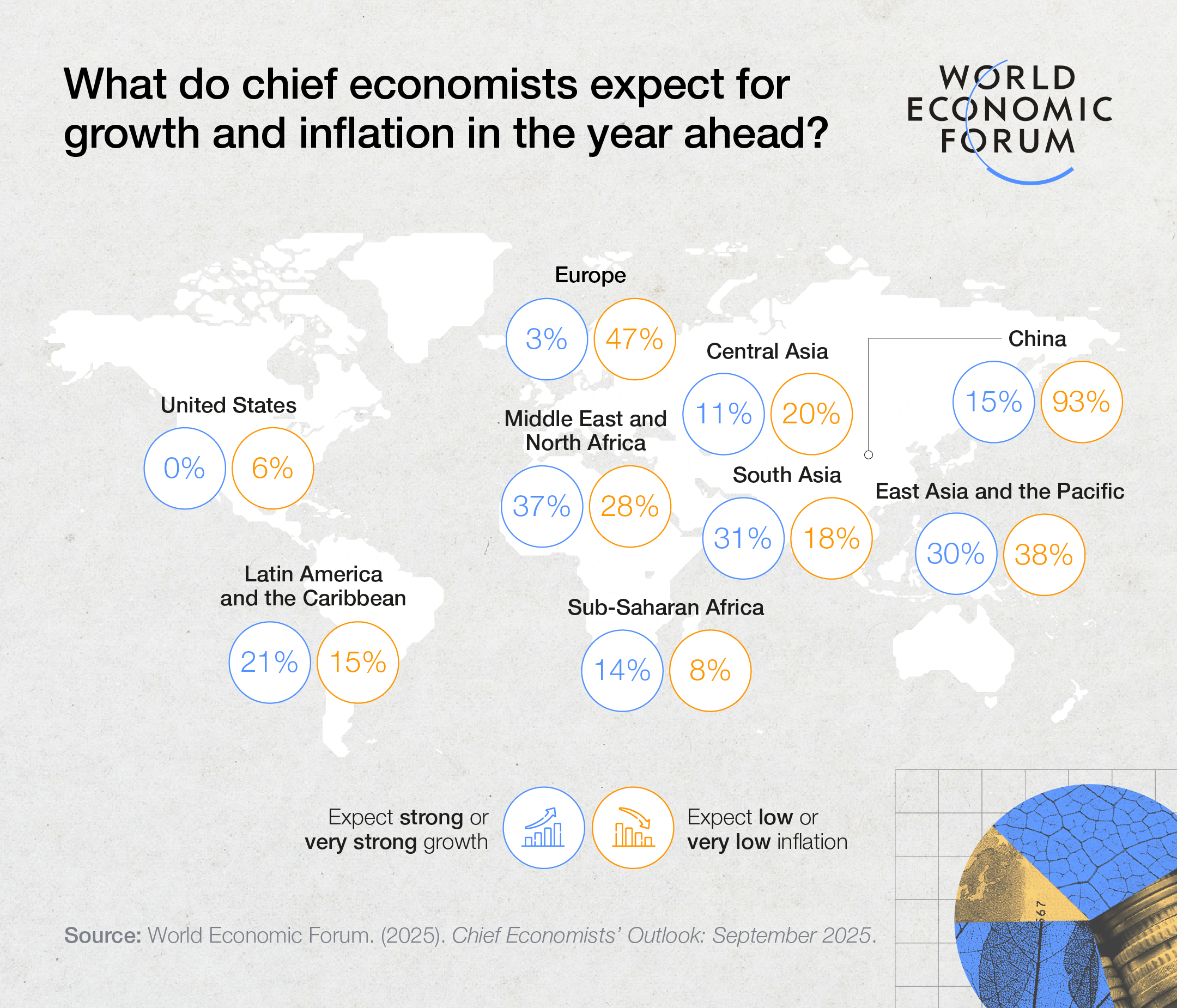
Global leaders from across sectors gathered in New York for the World Economic Forum’s Sustainable Development Impact Meetings 2025.
The gathering took place alongside the 80th United Nations General Assembly and will help progress on the UN Sustainable Development Goals.
Participants explored a range of issue areas including economic growth, responsible technology and sustainable development.
More than 1,000 global leaders gathered in New York this week for the World Economic Forum’s Sustainable Development Impact Meetings 2025 (SDIM25).
The participants, who come from government, business, international organizations, civil society and academia, convened to discuss solutions and drive impact related to the most urgent global challenges including ongoing humanitarian crises, inclusive economic growth and climate action. Key leaders included Muhammad Yunus, Chief Adviser of the Interim Government of Bangladesh; Mohammed Bin Abdulrahman Al Thani, Prime Minister and Minister of Foreign Affairs of the State of Qatar; and Kristalina Georgieva, Managing Director of the International Monetary Fund, to name a few.
SDIM25 came at a pivotal moment for the global economy, which continues to undergo profound transformations ranging from shifting trade dynamics to unprecedented technological advancements. The meetings also took place on the margins of the 80th United Nations General Assembly and will serve to accelerate renewed progress on the United Nations Sustainable Development Goals.
For more, see below for some of the highlights from SDIM25.

Image: Getty Images
Public sessions offer expert insights
Several panel discussions were livestreamed at SDIM25, bringing insights from top public and private sector leaders to the media and general public. The sessions examined the major issues impacting the global economy and explored how progress can be made on the shared challenges.
Instability on the world stage
An uncertain geopolitical era has emerged, marked by shifting alliances, volatile economic policies and weakening multilateral cooperation. In a public session, Geopolitics: Looking beyond Uncertainty, panelists explored how stakeholders can identify steps to strengthen global security and stability, and discussed how organizations can adapt to operate more effectively in an increasingly unpredictable world.
"We are now a bit surprised by the increased level of uncertainty in geopolitics," said Salah Ahmed Jama, Deputy Prime Minister of Somalia, adding that "we are firm believers in multilateralism, and we hope that multilateralism and a rules-based world order will be to the benefit of all."
Columbia University professor and former top US diplomat Victoria Nuland also warned in the session that "we might actually walk ourselves back to the brink of great power conflict if we are not talking and managing all of these challenges together."
Meanwhile, in another session, US Policymaking: Perspectives from Capitol Hill, three US lawmakers discussed shifts in US economic, energy, trade and foreign policies.
Meanwhile, in another session, US Policymaking: Perspectives from Capitol Hill, three US lawmakers discussed shifts in US economic, energy, trade and foreign policies.
Congressman Gregory Meeks explored how US foreign policy is evolving, detailing various positions such as the country's stance toward the new government in Syria. The new Syrian leadership, Meeks said, needs to be "moving in a direction that brings people together, especially some of the religious minorities that are in the region."
Congresswoman Young Kim examined US-China relations and discussed the interconnectedness of national security and economic security. Senator Sheldon Whitehouse also detailed shifts in US foreign policy—including toward Russia—and underscored the need for continuous global action on addressing the climate crisis.
"There's a true recognition in many of the capitals around the world that climate change is a really dangerous situation and it's getting worse fast." Whitehouse said.
Balancing energy security with climate action
The intersection of energy security, economic growth and the worsening climate crisis was a major topic of discussion at SDIM25.
In a public session, Energy Transition: Amping Up or Powering Down?, academics and private-sector leaders explored the ongoing clean energy transition and shifts in global energy markets, which have seen increased fragmentation in recent years.
"For the most part, security has gone up when we've had more diversity in supply and demand, and more flexibility," said David G. Victor, a Professor at the University of California, San Diego.
Meanwhile, Rebecca Boudreaux, President and CEO of Oberon Fuels, noted that "clean fuels and energy security go hand in hand" and Sumant Sinha, Chair and CEO of ReNew, stressed that "the issue of energy security in these volatile geopolitical times has become even stronger."
In another session, Climate Resilience: Securing Systems, Sustaining Lives, panelists discussed the need to create economic systems that protect the natural world as well as support scientific research.
“We, as scientists, are storytellers,” said Martha Muñoz, an Associate Professor of Ecology and Evolutionary Biology at Yale University. “The difference is the story is true; it’s the story of us and our place in the world.”
Trustful technology
The connection between the rapid advancements in new technology like AI and societal trust was another major topic of discussion at SDIM25.
“It’s going to be the biggest technological shift of our lifetimes,” Joel Kaplan, Meta’s Chief Global Affairs Officer, said of the impact of AI.
In a public conversation with World Economic Forum President and CEO Børge Brende, Kaplan also urged public- and private-sector leaders to align new regulations, stating that policies need to “strike the right balance between innovation, economic growth, national security, and safety more broadly.”
In a separate session, Restoring Trust in Tech, Director-General of Consumers International Helena Leurent explained how there is an "in-between space which is innovation with consumer protection involved," adding that "innovation doesn't need to happen divorced of people."
Meanwhile, Sabastian Niles, the President and Chief Legal Officer of Salesforce, urged the private sector to use AI and technology to "solve the problems of society."
Chief economists: 'Outlook remains weak'
Weak growth and systemic disruption lie ahead for the global economy, according to the World Economic Forum’s latest Chief Economists' Outlook.
The report, released during SDIM25, found that 72% of surveyed chief economists expect weak economic growth over the next year, with intensifying trade disruptions, rising policy uncertainty and accelerating technological change impacting the global economy. The global economy, the report states, is undergoing a "period of profound transformation, marked by persistent short-term disruption and heightened uncertainty as well as long-term structural change."
"We're both slowing and narrowing," Paul Gruenwald, Global Chief Economist of S&P Global, stated during an SDIM25 session, The Briefing Room September 2025: The Great Divergence?. "We're still in a relatively risky environment."
The outlook also highlights sharp regional fault lines. Emerging markets are anticipated to be the main engines of growth, with one out of three chief economists expecting strong or very strong growth in the Middle East and North Africa, South Asia, East Asia and Pacific.
"When you look at investments and what the investments into the future are, they are increasingly happening in those areas of the world," Nela Richardson, Chief Economist of ADP, stated during the SDIM25 session.
Chief Economists' Outlook, September 2025
Image: World Economic Forum
Chief economists, however, except weaker growth in more advanced economies. Slightly more than half (56%) of chief economists anticipate moderate growth in China, though deflationary pressures are expected to persist, while 40% expect weak growth in Europe and 52% anticipate weak or very weak growth in the United States.
"When it comes to global growth, I think it's a continuation of a [downward] trend," said Pedro Conceição, Director of the Human Development Report Office at the United Nations Development Programme. "But things didn't collapse, so there might be some hope."
The outlook also found that as economies adapt to both short- and long-term shifts, economic growth pathways are likely to diverge. Over half of the chief economists (56%) say they expect great divergence between developing and advanced economies over the next three years.
"Over the last 4 years, there's actually a divergence in human development between the countries at the top and at the bottom," Conceição added. "It's very hard to see that process reversing."
More reports, more knowledge
Responsible AI innovation: Only 10% of organizations have effective AI governance structures in place, and fewer than 1% have operationalized comprehensive, end-to-end responsible AI practices. Such a gap presents a defining opportunity to build public trust, develop resilient markets and safeguard rights while progressing AI innovations.
To seize this opportunity, the World Economic Forum’s AI Governance Alliance, in collaboration with Accenture, has developed Advancing Responsible AI Innovation: A Playbook. The report offers nine actionable, scalable and adaptable plays for turning responsible AI principles into operationalized practice within organizations in cooperation with government efforts to foster a trustworthy AI ecosystem.
Defossilizing industry: Carbon capture and utilization (CCU) present an opportunity to reduce emissions from industrial supply chains by converting captured CO₂ into valuable carbon-based products such as fuels, chemicals and building materials.
A new report, Defossilizing Industry: Considerations for Scaling-up Carbon Capture and Utilization Pathways, explores the potential role that emerging CCU pathways could play in a sustainable industrial transition and focuses on the challenges faced by innovators and first movers.
Training and upskilling industrial workers: As the manufacturing sector faces unprecedented challenges, the need for innovative talent strategies has never been more critical.
A new white paper, Empowering Frontlines: Retaining, Training and Upskilling Industrial Workforce, delves into the dual imperatives of retaining and upskilling talent to ensure long-term competitiveness and productivity. The paper highlights the concerning attrition rates and widening skills gaps across advanced manufacturing and supply chains. With over 40% of Gen Z employees in manufacturing considering leaving their jobs within the next 3-6 months, the urgency for effective talent management is clear.
Economic resilience and climate change: In the next 25 years, climate-driven health impacts could result in the loss of more than $1.5 trillion in lost output from select climate-health illnesses, according to a new report, Building Economic Resilience to the Health Impacts of Climate Change.
The report, developed in collaboration with Boston Consulting Group, urges companies to act now to protect workforce health, build operational resilience and safeguard productivity. Eric White, the World Economic Forum's Head of Climate Resilience, noted in a statement that "every year we delay embedding resilience into business decisions, the risks to human health and productivity climb and the costs of adaptation rise."
